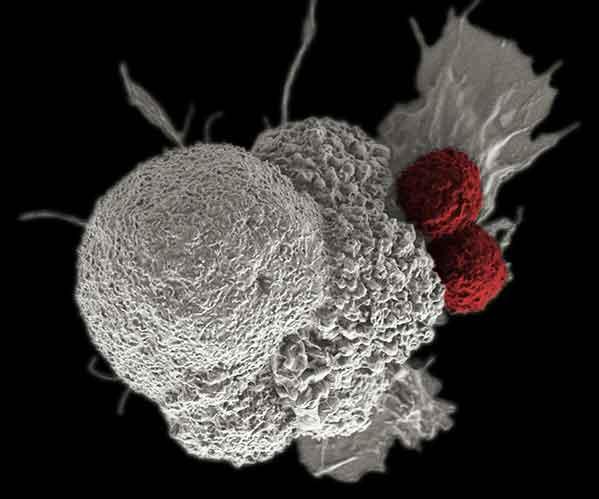
Researchers identify CTLA-4 response marker
German and US researchers have found a biomarker that identifies tumours responding to CTLA-4 checkpoint blockers.
The research team headed by Simon Heideger and Hendrick Poeck from Technical University of Munich together with colleagues from Memorial Sloan Kettering Cancer Center, New York, provided new evidence that activation of the RNA-sensing molecule RIG-I on tumour cells is critical for responsiveness to checkpoint blockade. As only 30% of cancer patients respond to checkpoint inhibitor therapy while some show severe side effects, RIG-I expression might identify the patients benefiting most from this sort of cancer immunotherapy. Secondly, therapies, which combine a checkpoint blocker and a RIG-I agonist, might help boost the effectiveness of checkpoint inhibitors and, thus, enhance the response rate to cancer immunotherapy.
Specifically, Heideger et al. provided preclinical evidence that a combination of a RIG-I oligonucleotide agonist and a CTLA-4 checkpoint blocker prolonged survival in several preclinical cancer models. Furthermore, high expression of DDX58, the gene encoding RIG-1, in cell cultures made from samples of melanoma patients predicted improved survival under CTLA-4 therapy. The authors suggest that testing tumour cells from humans for susceptibility to RIG-I-driven cell death might serve as a biomarker to predict treatment outcomes of CTLA-4 checkpoint inhibition.
Importantly, the research team was also able to demonstrate how immunotherapy with anti-CTLA-4 and its combination with anti-PD-1 antibodies relies on tumour cell-intrinsic activation of the cytosolic RNA receptor RIG-I. Mechanistically, tumour cell-intrinsic RIG-I signaling induced caspase-3-mediated tumour cell death, cross-presentation of tumor-associated antigen by CD103-positive dendritic cells, subsequent expansion of tumour antigen-specific CD8+ T cells, and their accumulation within the tumour tissue. The authors suggest to use therapeutic targeting of RIG-I with 5?-triphosphorylated RNA to boost the efficacy of CTLA-4 checkpoint blockade.
This is not the first report stating RIG-1 activation can boost immune reactions. A first-in-class RIG-I agonist (MK-4621, RGT100) has already been tested in humans. Data from a Phase I/II trial showed promising pharmacokinetics and safety but it was too early to comment on efficacy. Its developer, German Rigontec GmbH, was acquired by Merck & Co (in Europe Merck, Sharpe & Dohme, MSD) in September 2017.



 adobe.stock.com - ipopba
adobe.stock.com - ipopba BioDlink
BioDlink